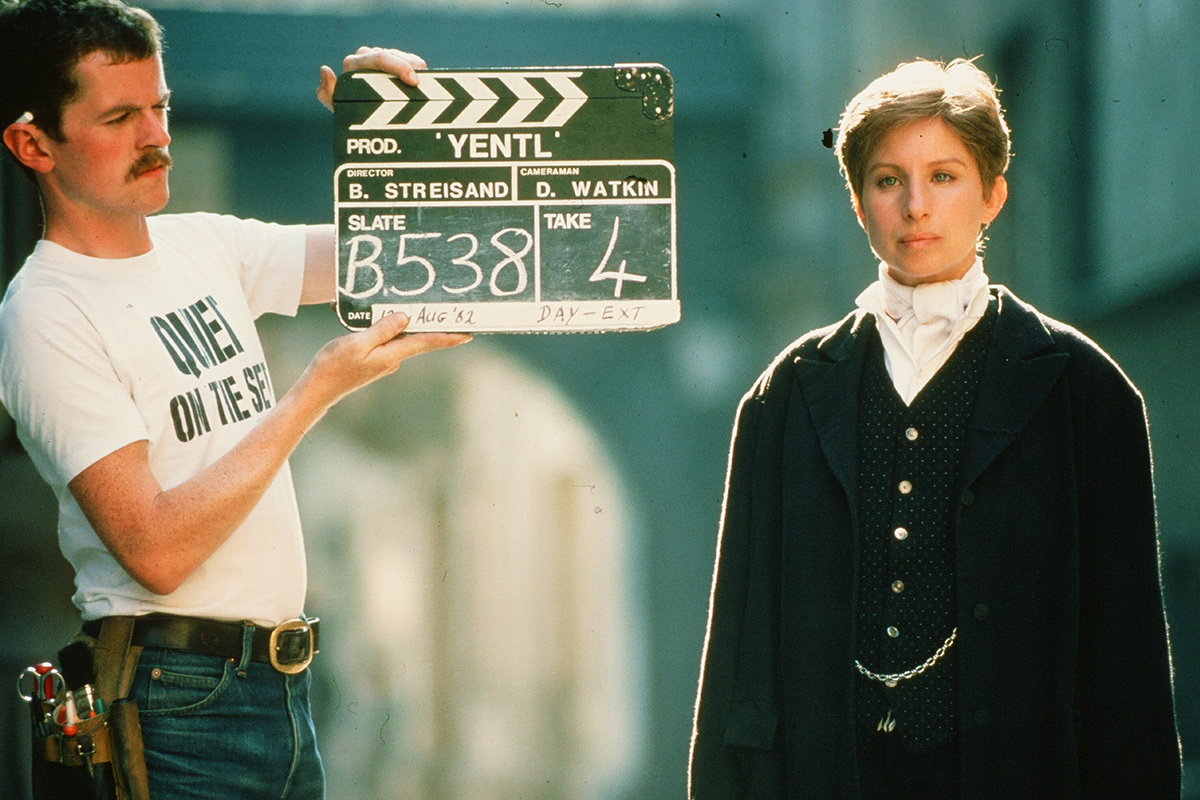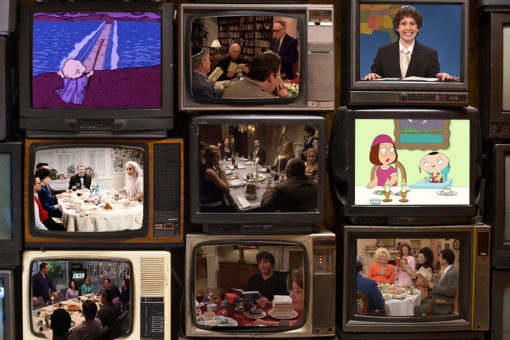“Although no one should assume that there’s a simple one-to-one correspondence between what appears onscreen and what happens offscreen,” writes Helene Meyers in the introduction to her new book, “Movie-Made Jews,” “most critics agree that movies matter because representation matters… What we watch helps to form our images of ourselves, others, and the world.” She puts it more concisely a few lines earlier: “While it’s a truism that Jews make movies, this book brings into focus the diverse ways movies make Jews.”
In the eight chapters that follow, Meyers covers onscreen depictions of antisemitism, assimilation, the Holocaust, queer Jews, intersectional alliances (and struggles) and feminism. The book’s self-defined mission statement is to present “a rich, usable American Jewish cinematic tradition that extends well beyond ‘Fiddler,’ ‘Yentl,’ and ‘The Chosen’ and is too often overlooked.” It posits that Jewish audiences can be influenced by onscreen portrayals, or in opposition to them — and, of course, by arguing about them (we are talking about Jews, after all).
Meyers, who is the McManis University chair and chair of the English department at Southwestern University, touches on Jews’ singular place in Hollywood, and how not all Jews occupy the same space in the movie industry. “White Jews have historically made movies,” she argues, “and, in part because of this racialized cinematic history, are positioned simultaneously as cultural insiders and outsiders… However, that insistence on Jewish difference is also an intensive look at intra-Jewish difference. Because what is present — and absent — onscreen influences how we look and how we learn to look, it matters that a diversity of Jews along the cultural and religious spectrum are seen and recognized by one another and by non-Jewish eyes.” Amen!
“Movie-Made Jews: An American Tradition” puts words to a lot of trends I’ve observed in the wild as an arts and culture writer for a Jewish publication. For instance: Jewish audiences claim movies as Jewish that “often [aren’t] seen as such by mainstream reviewers,” and a movie’s Jewishness is “mainly in the eye of the Jewishly literate beholder.” But my favorite new vocabulary I learned from the book is “Jewhooing.” It’s defined by David Kaufman as “the naming and claiming of famous ‘members of the tribe’ — and the consequent projection of group identity onto them,” and is integral to “the construction of Jewish identity and the related countering of assimilation—an unconscious attempt to reverse the very processes of social integration and de-Judaization that touch most every Jew in the modern world.” In other words, being obsessed with Jewish celebrities actually protects Jewish culture! It’s noble, guys. And it has a queer cousin, Jewqhooing (how do you pronounce that?) — “a process that affirms and simultaneously constructs queer Jew-ishness.”
Meyers dedicates her book to “Klal Yisrael, in all its diversity and to those who know that it’s never only a movie.” I spoke to her via email about my new favorite word, what makes a Jewish movie, and the best Jewish movie line of all time (in her opinion).
This conversation has been condensed and lightly edited for clarity.
I’m obsessed with the term “Jewhooing” (and its queer cousin, “Jewqhooing”) which I learned from the book — that’s probably 80% of Alma’s reason to exist. Do you do it? Who are the celebrities you are most proud to call members of the tribe?
Of course, I do it — with a great deal of self-consciousness, sometimes with a bit of irony, and always with joy! Three of my favorite celebrity members of the tribe are explicitly discussed in the book: Harvey Milk, RBG and Babs. I would also add Jon Stewart to that list. Smarts, humor and menschlikhkeit — what’s not to like?
What is the first Jewish movie you remember seeing?
When it comes to movies as with lovers, I think we might put a bit too much emphasis on our first. “Yentl” was certainly not my first Jewish movie, but it was formative. That movie did provide my first glimpse of a woman in a tallit, and it spoke to my Jewish feminist angst and hunger. Like Yentl’s father, my dad was proud of my intellectual chops and died way too young, so that became another point of connection.
What makes a Jewish movie, for you personally? Or, what makes a movie Jewish enough to be counted in the canon of “Movie-Made Jews”?
My vision of a Jewish movie is eclectic and pluralist. Too often, Jewish movies are only counted as such if they explicitly represent Judaic practice and ritual. Or as Barry Levinson snarkily puts it, “do they have to wear yarmulkes in all the scenes? How many religious artifacts have to be in the film?” To make the cut for “Movie-Made Jews,” a film had to include explicit Jewish subject matter OR had to be experienced as a Jewish movie by filmgoers. So, I not only took into account what was onscreen but also considered the reception of the movie. In the tradition I trace, those who might be identified as “just Jews” reside alongside those who are traditionally — and sometimes untraditionally — observant. I think of Jewish diversity as a real strength in the community and in cinema.
Do you think it matters, in a Jewish film, if Jewish actors and creatives were involved? Can a great Jewish film be made without Jewish involvement? There was debate around “Shiva Baby,” for instance, which cast a non-Jewish female lead in a very Jewish role.
My academic answer to this question is that Jewish literacy rather than Jewish identity is necessary to make a great — and even a not-so-great — Jewish film. But my kishkes (which BTW speak with a strong Brooklyn accent) can only answer that question with another question: WHY would anyone make a Jewish movie without involving Jews (unless, of course, you’re Mel Gibson, and then we know why)?
Both “Fading Gigolo” and “Keeping Up with the Steins,” two films that I include in a chapter titled “Assertively Jewish Onscreen,” were directed by non-Jews, John Turturro and Scott Marshall. Both of these directors made use of Jewish consultants and included Jewish cast members. Elliot Gertel, a writer who is notoriously critical of most onscreen depictions of Jewish life, proposed an honorary Jewish director award for Turturro. And “Keeping Up with The Steins” is part of the b’nai mitzvah curriculum in some congregations. These two profoundly Jewish films complicate assumptions that you have to be a Jew to make a Jew onscreen. I should also mention that both Turturro and Marshall are married to Jews, which I gleefully note to drive the anti-intermarriage crowd crazy!
You talk about the “Jewish closet” as well as the “queer closet” in the book: “the most profound parallel between these two documentaries and thus Jewish and queer film history is the emphasis on gay and Jewish identifications and desires strategically being performed through codes, ‘subtext,’ indirection.” And you mention a line from the movie “Treyf,” in which someone RSVPs to an event with: “While I’m a Jew and a lesbian, I’ve never really seen myself as a Jewish lesbian.” Can you talk about the relationship/overlap — and the separation — between these two minorities onscreen?
Historically, Jews and queers have shared the experience of being oppressed minorities who have the “privilege” of being able to pass or assimilate onscreen and off. Think about all the Jewish movie stars who changed their names and all the queer actors who played it straight. Antisemitism and homophobia were baked into the Hays Production Code, which regulated what could be shown onscreen, and the blacklist was backlash against the open secret of Jewishness and queerness in Hollywood. Also, Jews historically have often been perceived as gender benders: Mouthy women and studious men don’t conform to dominant ideas of femininity and masculinity. So, for lots of complicated reasons, Jews and queers have been set up as parallels or substitutes for one another. There’s a great line in Paul Mazursky’s “Next Stop, Greenwich Village” that wonderfully captures this: A Black queer character named Bernstein is asked if he’s Jewish and he responds, “No, I’m gay.”
But when Jews and queers are paralleled, queer Jews can find themselves having to choose between one closet or the other. Of course, homophobia within Jewish cultural and religious traditions plays its part in this, as does antisemitism within queer communities. Even films that do really important anti-homophobic work such as “I Now Pronounce You Chuck and Larry” and, to a lesser extent, “Kissing Jessica Stein” end up separating the Jew from the queer. In “Movie-Made Jews,” I focus on films that explore and refuse this separation. Sometimes, as in the case of “Trembling Before God,” “Treyf” and “Hineini,” that claiming of Jewish queerness is explicitly onscreen. But the Jewishness of the queer icon Harvey Milk doesn’t appear onscreen in Van Sant’s monumental film, “Milk.” Rather, it appears thanks to the Jewqhooing done by queer Jewish viewers.
The book has a whole chapter on cinematic alliances in films featuring Jews and other racial and religious groups. What role do you think Jews play in the supposed paradigm shift in Hollywood, represented by #OscarsSoWhite, WSYWAT (We See You White American Theater), #TheShowMustBePaused, and other movements that have come out of the racial justice consciousness of 2020? You mention the Kickstarter campaign for “Wish I Was Here” and the backlash around Braff’s perceived white (and studio) privilege, which feels relevant to this question.
Whenever we talk about white Jews and race, I wish people would recognize the racial privilege of white Jews while simultaneously acknowledging that white Jews have historically had a complicated relationship to whiteness and might be usefully viewed as off-white. In other words, I wish we could manage to racially chew gum and walk at the same time! I also wish that we could remember that anti-Black racism and antisemitism are part of the cultural air that we all breathe — that strikes me as so much more productive than formulaic ideas about Jewish racism and Black antisemitism that often actively discourage alliance politics and keep white supremacy going strong.
So that gives you some insight into how I approach film criticism and history. As I make clear in the book, Black/Jewish relations are a complicated cinematic social problem that goes back to the use of blackface in “The Jazz Singer” (1927), that makes a productive pitstop in Robert Rossen’s “Body and Soul” (1947), and that works in provocative ways throughout Spike Lee’s career. So, if you want to understand contemporary conversations about Black and Jewish representations in film and make progress on very different but overlapping histories and problems, I think we need to go beyond 2020 hashtags. This is where scholarship might help us to see more diverse representation of Black and Jewish communities as complementary rather than competing goals. The backlash against the Kickstarter campaign for Braff’s really important film “Wish I Was Here” strikes me as an erasure of Jewishness that did absolutely nothing to chip away at the Black soul-destroying whiteness of the film industry. If we’re going to beat white supremacy onscreen and off, we’ve got to get beyond zero sum politics.
Relatedly, what can we learn from the Castlemont story? And what about someone like Black Jewish filmmaker Janicza Bravo and her film “Lemon,” who has said that she felt, around that film, that people assumed she couldn’t speak to Jewishness when, in fact, she could?
In 1984, a well-intentioned teacher took a group of mostly Black Castlemont High School students to “Schindler’s List” without providing them with a much-needed, grade-appropriate Holocaust curriculum. Students talked and laughed during the movie, which horrified white Jewish members of the audience. This got woven into the overwrought media and political narrative of Black gentiles and white Jews as antagonists. Steven Spielberg visited the school, connected with the students, and focused his efforts on both listening and educating.
Olivia Peace’s “Tahara” and Brad Rothchild’s “They Ain’t Ready For Me,” two 2020 films that came out after “Movie-Made Jews” was already in production, make me think that the representation and reception of Black Jews onscreen — and off — is going to be an important new chapter in American Jewish film history.
You address some of the complications of describing Holocaust movies as, in your words, a “viable and profitable subgenre.” Aside from the complexities of figuring out how to portray a genocide onscreen, do you feel like there is “Holocaust fatigue” in our culture at the moment, and in media?
At the moment, I’m not sure which is more disturbing and dangerous: Holocaust fatigue, Holocaust ignorance, Holocaust appropriation or Holocaust obsession. Paradoxically, movies have de-Jewed the Holocaust by Americanizing and universalizing it while also presenting it as the Jewish story. In “Movie-Made Jews,” I’m interested in films that are committed to never forgetting the Shoah while also reminding us that it didn’t happen to American Jews, though we do live in the shadow of it. I’m also committed to not reducing Jewishness — cinematically or otherwise — to attempted genocide.
“Movie-Made Jews” focuses on movies, of course, but what role does TV play in this media-driven Jewish perception? Are there “TV-made Jews”? Israeli TV in particular has played a huge role in the Jewish cultural landscape of the pandemic — with “Shtisel,” a huge hit across Jewish and non-Jewish communities alike, and with remakes like “Euphoria.”
I’m not a television studies scholar, but I am an avid TV watcher. There have certainly been a number of series in recent years that have put Jews onscreen in meaningful ways and that I’ve watched religiously. You mention “Shtisel” (one of my faves). I’d add “Srugim” and “Transparent” (which I still think is worth talking about despite the Tambor problem). Based on media and community commentary, these shows seem to be impacting how Jews look at themselves (and how gentiles view Jews). There’s probably a book to be written titled “TV-Made Jews.” I’m not interested in writing it, but I sure would love to read it!
Favorite line from a Jewish movie? “Shut up, I’m atoning” from “Kissing Jessica Stein” has to be up there.
Definitely a great line, but it might be edged out by a lawyer (played by Adam Arkin) proclaiming in “A Serious Man” that a get is “not really a legal matter.”
As Irwin asks Benjamin around his bar mitzvah in “Keeping Up with the Steins,” what’s your favorite thing about being Jewish?
Answering a question with a question. What’s not to like about that commitment to debate and critical thinking?



